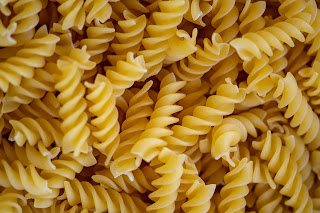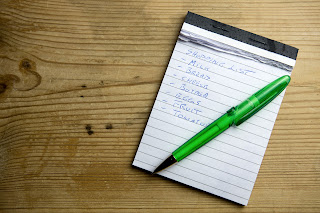Ways to eat healthily on a budget
I’m sure you don’t need me to tell you that the cost of
living has increased in the UK. It’s not just food that’s gone up, with bills,
mortgages, and other expenses on the rise too. It can be difficult to continue
eating the foods you normally do when you're on a tighter budget, so I’ve got
some tips that will hopefully help.
Let’s get right in…
Focus on plant protein:
There are many protein sources that don’t include meat or
fish. Beans, lentils, and grains can be a great source of protein. And they're
cheaper than buying cuts of meat. In lots of meals, the meat can be swapped for
a plant based protein instead. Think a chickpea curry, lentil Bolognese, or a
mixed bean casserole.
You can get a tin of beans for as little as 35p* depending
on what your nearest shop is, so this is a big saving compared to meat. Plant
sources of protein will also contain more fibre than animal proteins, and
considering most adults in the UK don’t eat enough fibre, it’s not a bad swap.
You don’t have to buy fresh fruit and veg:
We should be aiming for 5 portions of fruit and vegetables
each day, but it can be hard to meet this with some fruit and veg being very
costly. It’s helpful to remember that frozen or tinned produce also counts as
one of your five and these can be cheaper. Tinned or frozen produce can also
save money as it reduces waste, and you don’t have to worry about it going off.
An example of this is Tesco’s Cauliflower and broccoli
florets. A 900g bag of this vegetable mix frozen is 80p, whereas the same
weight if bought fresh would be £2.67*.
It’s also worth trying to buy fruit and vegetables when
they’re in season, as they tend to be cheaper. Fruit and veg currently in
season this November include: cabbage, swede, beetroot, chard, parsnips, pears,
and apples.
Bulk buy if you can:
Another tip is to buy in bulk if you can. Obviously, this is a higher initial cost, but over time it works out cheaper. Looking at prices of food per kg is a really useful way to see which deal gets you the best bang for your buck. This tends to work well for beans, grains, and other carbohydrate sources like rice or pasta.For example, a 3kg bag of fusilli pasta is £3.75, or £1.25
per kg, whereas a 500g bag of fusilli is 95p or £1.90 per kg*. So, while the
smaller bag initially seems cheaper, you’ll get more pasta for your money with
a bigger bag. It’s worth having a closer look at price per kg when you’re on
your next shop.
Shop around for the best deals:
If you’re able to get to different supermarkets, it’s worth
looking around for the best prices for things. And you can take advantage of
special offers at each shop. Aldi do a ‘Super 6’ promotion where each week a
selection of fruit and vegetables will be discounted. And Iceland for a 3 for
£10 offer on bags of frozen fish for example.
It’s worth looking at your local shops and seeing what type
of deals they offer. You can then try to plan meals that will incorporate these
cheaper ingredients. This leads me onto my next point.
Meal plan and write a shopping list:
Meal planning can be a great time saver and it means that
you know exactly what ingredients to buy. This will help to write a shopping
list and can save money as you won't be buying things that you don’t need. It
also means you can utilise your ingredients better and plan meals that will use
up the ingredients you buy. This reduces waste and also saves money.
Additionally, meal planning can mean you use leftovers as
you can plan them into your meals for the week. This again reduces waste and
means all the food you buy will be eaten, so it’s not money wasted.
Buy supermarket own brand:
Buying non-branded items can save money and a lot of the
time you won't be able to taste a difference. This works well for products like
pasta, rice, bread, dairy items, and store cupboard like oils, spices, and
tinned foods. The money you save on these items may allow you to purchase other
foods too.
Cook your own meals, if able:
Finally, another way to eat healthily on a budget is to cook your own meals. Ready meals or convenience items like precut vegetables often come at a cost, so if you’ve got the time to buy unprepared ingredients and cook from scratch, this is likely to save you some money. It also means you're in control of what's in the meal and can put as much sugar/oil/salt as you want.
I can appreciate that not all of these tips will work for
everyone and that for some, even using these tips may not be enough to cover
the costs of things. But hopefully every small saving will make a difference. I’ll also include some links in the references section on
accessing a food bank if you need one.
Key points:
- Some ways to eat healthily on a budget include: buy frozen or tinned produce, buy supermarket own brand, buy items in bulk if you can, and utilise plant based protein sources.
- For some people, money saving tips aren’t enough, there’s links to food banks below.
I hope you found this post useful.
Bye for now 👋
References:
https://www.trusselltrust.org/get-help/find-a-foodbank/
https://www.bankuet.co.uk/find-a-foodbank
https://www.tesco.com/groceries/en-GB/products/276775218
https://www.tesco.com/groceries/en-GB/products/282484692
https://groceries.asda.com/product/pasta-tubes-shells-spirals/asda-fusilli/37484
https://groceries.asda.com/product/pasta-tubes-shells-spirals/asda-fusilli/518334
https://www.nhs.uk/live-well/eat-well/digestive-health/how-to-get-more-fibre-into-your-diet/
https://groceries.asda.com/product/pasta-tubes-shells-spirals/asda-fusilli/518334
*Prices correct at time of writing 12/9/23
.jpg)



.jpg)

Comments
Post a Comment